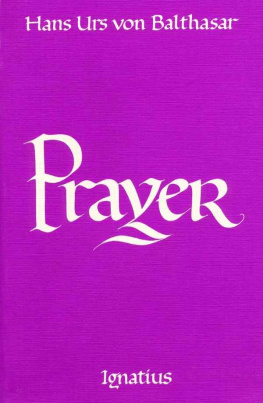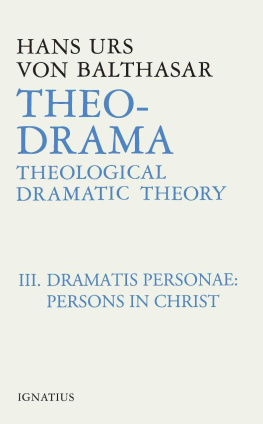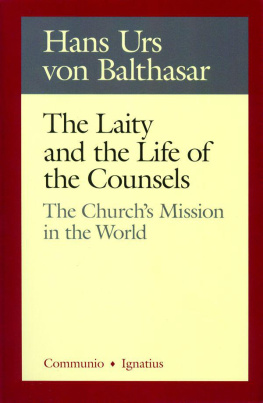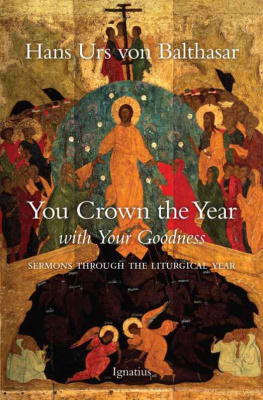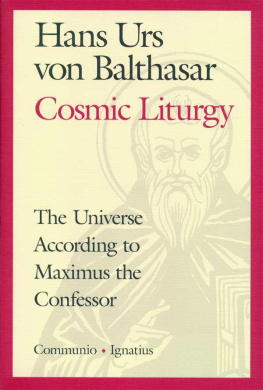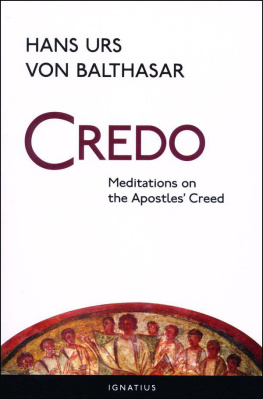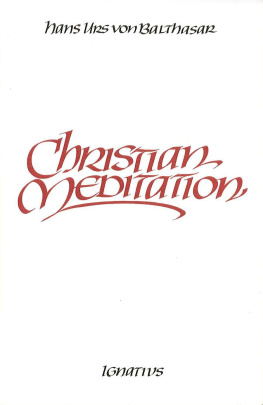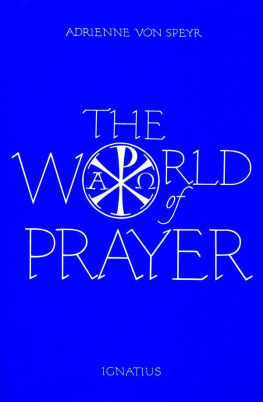Hans Urs von Balthasar - Prayer
Here you can read online Hans Urs von Balthasar - Prayer full text of the book (entire story) in english for free. Download pdf and epub, get meaning, cover and reviews about this ebook. year: 1986, publisher: Ignatius Press, genre: Religion. Description of the work, (preface) as well as reviews are available. Best literature library LitArk.com created for fans of good reading and offers a wide selection of genres:
Romance novel
Science fiction
Adventure
Detective
Science
History
Home and family
Prose
Art
Politics
Computer
Non-fiction
Religion
Business
Children
Humor
Choose a favorite category and find really read worthwhile books. Enjoy immersion in the world of imagination, feel the emotions of the characters or learn something new for yourself, make an fascinating discovery.
- Book:Prayer
- Author:
- Publisher:Ignatius Press
- Genre:
- Year:1986
- Rating:4 / 5
- Favourites:Add to favourites
- Your mark:
- 80
- 1
- 2
- 3
- 4
- 5
Prayer: summary, description and annotation
We offer to read an annotation, description, summary or preface (depends on what the author of the book "Prayer" wrote himself). If you haven't found the necessary information about the book — write in the comments, we will try to find it.
Prayer — read online for free the complete book (whole text) full work
Below is the text of the book, divided by pages. System saving the place of the last page read, allows you to conveniently read the book "Prayer" online for free, without having to search again every time where you left off. Put a bookmark, and you can go to the page where you finished reading at any time.
Font size:
Interval:
Bookmark:
HANS URS VON BALTHASAR
PRAYER
HANS URS VON BALTHASAR
PRAYER
TRANSLATED BY
GRAHAM HARRISON
IGNATIUS PRESS SAN FRANCISCO
Title of the German original:
Das Betrachtende Gebet
1955 Johannes Verlag
Einsiedeln, Switzerland
Cover by Victoria Hoke Lane
With ecclesiastical approval
1986 Ignatius Press, San Francisco
All rights reserved
ISBN 978-0-89870-074-9
Library of Congress catalogue number 85-82172
CONTENTS
THE ACT OF CONTEMPLATION
a.
b.
c.
a.
b.
c.
d.
THE OBJECT OF CONTEMPLATION
THE TENSIONS OP CONTEMPLATION
PREFACE
Many christians are aware of the necessity and the beauty of contemplative prayer and have a sincere yearning for it. Yet, apart from tentative efforts soon abandoned, few remain faithful to this mode of prayer, and even fewer are really convinced and satisfied by their own practice of it. In the life of the Church, contemplation is surrounded by an atmosphere of despondency and pusillanimity. We would like to pray, but we cannot manage it. Our time of prayer passes leaving us distracted, and since it does not seem to yield any tangible fruit, we are not loath to give it up. From time to time we take up a book of meditations which presents us, ready-made, with the contemplation we ought to produce for ourselves. We observe someone else eating, but it does nothing to fill our stomachs. We may read his meditations, but what we have done is spiritual readingnot contemplation. We have seen how someone else has encountered the word of God, we have even profited by his encounter, but all the same it was his and not oursand we ourselves have achieved nothing. Often because we are too comfortable, which is something that can be overcome. And often out of a fearfulness which robs us of the confidence to take steps on our own.
At this point the present series aims to be of assistance. It offers, not fully fashioned meditations, but points for meditation, above all in connection with passages from the New Testament. They are designed simply to provide stimuli, perspectives and possible starting points for personal and individual contemplation. They are presented in a terse and sober form, so that they can be used neither as a commentary on the scriptural text nor as spiritual reading, but only as instrumental in the practice of contemplation. Their aim is to become superfluous: whenever the person at prayer feels he can leave this crutch aside, whenever his own wings bear him aloft, he can dispense with these texts without the slightest regret.
To help the contemplative use these tools, various introductory books are proposed, providing information about the nature and form of scriptural contemplation. The aim of the present work is to speak of the depth and splendor of this form of prayer within the whole context of Christian revelation, to help readers discover delight in it and to develop their sense of its indispensable necessity in the Christian life in general and in todays world in particular. Anyone entering the sphere of radiance of the divine word is held fast by it; he knows from experience that this word not only communicates knowledge about God, buthidden within the garb of the letter-actually has divine qualities: in itself it is an overpowering manifestation of Gods infinity and truth, his majesty and love. Gods epiphany compels the hearer to kneel in humble submission. The latter had imagined that he was dealing with a word he could grasp and evaluate, like other great and profound utterances of mankind; yet once he enters its field of force, he himself is the one who is grasped and evaluated. He had wanted to approach Jesus in order to see him (Come and see!), and now, under the gaze of Jesus, he finds that it is he who has long been observed, seen through, judged and accepted in grace by Jesus. All he can do now, therefore, is to fall down and worship the Word: Master, you are the Son of God; you are the King of Israel! This conquest, however, is only the starting point: You shall see greater things than these.... You will see heaven opened, and the angels of God ascending and descending upon the Son of man (Jn 1:46-51).
Contemplations ladder, reaching up to heaven, begins with the word of scripture, and whatever rung we are on, we are never beyond this hearing of the word. In contemplation, just as we can never leave the Lords humanity behind us, neither can we get beyond the word in its human form. It is in the humanity that we find God, in the world of sense that we find the Spirit.
PART ONE
THE ACT OF
CONTEMPLATION
CHAPTER ONE
THE NECESSITY OF CONTEMPLATION
M OST CHRISTIANS are convinced that prayer is more than the outward performance of an obligation, in which we tell God things he already knows. It is more than a kind of daily waiting attendance on the exalted Sovereign who receives his subjects homage morning and evening. And although many Christians experience in pain and regret that their prayer gets no further than this lowly stage, they are sure, nonetheless, that there should be more to it. In this field there lies a hidden treasure, if only I could find it and dig it up. This seed has the power to become a mighty tree bearing blossoms and fruit, if only I would plant and tend it. This hard and distasteful duty would yield the freest and most blessed kind of life, if only I could open and surrender myself to it. Christians know this, or at least they have an obscure intimation of it on the basis of prior experiences of one kind or another, but they have never dared to follow these beckoning paths and enter the land of promise. The birds of the air have eaten up the sown word, the thorns of everyday life have choked it; all that remains of it is a vague regret in the soul. And if, at particular times throughout life, they feel an urgent need for a relationship with God which is different from the incessant repetition of set prayers, they feel clumsy and lacking in ability, as if they had to speak in a language without having mastered its grammar. Instead of fluent conversation they can only manage a few, halting, scraps of the heavenly idiom. Like a stranger in a foreign land, unacquainted with the language, they are almost inarticulate children once again, wanting to say something but unable to do so.
This example could be misunderstood, for we do not make conversation with God. Yet there are two respects in which it does apply: firstly, prayer is a conversation between God and the soul, and secondly, a particular language is spoken: Gods language. Prayer is dialogue, not mans monologue before God. Ultimately, in any case, there is no such thing as solitary speech; speech implies reciprocity, the exchange of thoughts and of souls, unity in a common spirit, in a common possession and sharing of the truth. Speech both demands and manifests an I and a Thou. In prayer, moreover, man speaks to a God who has long since revealed Himself to him in a Word which is so stupendous and all-embracing that it can never be past tense; this Word resounds through all times as a present reality. The better a man learns to pray, the more deeply he finds that all his stammering is only an answer to Gods speaking to him; this in turn implies that any understanding between God and man must be on the basis of Gods language. It was God who spoke first, and it is only because God has expressed, exteriorized, Himself in this way that man can interiorize himself toward God. Just think of the Our Father which we address to him every day: is not this his own word? Were we not taught it by the Son of God, who is God and the Word of God? Could any man ever have produced such language on his own initiative? Was not the Hail Mary first proclaimed by an angels lips, i.e., in the language of heaven? And as for the words uttered by Elizabeth, filled with the Spirit, were they not the response to her first meeting with the incarnate God? Whatever could we say to God if he himself had not taken the first step in communicating and manifesting himself to us in his word, so that we have access to him and fellowship with him? For we have been permitted to glimpse his inner nature, to enter into it, into the inner core of eternal truth; bathed in this light which radiates upon us from God, we ourselves become light and transparent before him.
Next pageFont size:
Interval:
Bookmark:
Similar books «Prayer»
Look at similar books to Prayer. We have selected literature similar in name and meaning in the hope of providing readers with more options to find new, interesting, not yet read works.
Discussion, reviews of the book Prayer and just readers' own opinions. Leave your comments, write what you think about the work, its meaning or the main characters. Specify what exactly you liked and what you didn't like, and why you think so.

